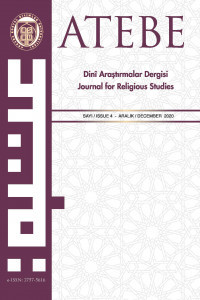İslam’da Müşrik Çocukları Meselesi
Müşrik çocukları meselesi, başka bir deyişle gayrimüslimlerin akil baliğ olmadan ölen çocuklarının ahiretteki durumu, kader konusu ile de iç içe olan bir meseledir. Bu çocukların Cennetlik mi yoksa cehennemlik mi olacağı hususu meselenin bu problemin özünü oluşturur. Bu mesele hakkında, Hz. Peygamber tarafından zaman zaman değişik hükümler verilmiştir. Bu hükümlerle, öncelikle yeni müslüman olan insanların yönlerini tam olarak Kur’an’a ve İslam’a çevirmeleri hedeflenmiş ayrıca da İslam toplumunun düşmanlarına karşı savunma stratejisi geliştirilmiştir. Konunun bu yönü esas alınarak yapılan araştırma, daha çok bir usul çalışması niteliği arz etmektedir. Neticede, bu konuda varit olan hadislerin ve yaşanan olayların daha doğru anlaşılıp daha kolay anlatılmış olacağına inanıyoruz. Aksi takdirde mesele hakkındaki tartışmalar bugüne kadar olduğu gibi sürüp gidecek ve hem Kur’an hem de Sünnet’ten türetilen deliller arasındaki karmaşıklıkların çözümlenmesi mümkün olmayacaktır. Kâfirlerin çocukları ile ilgili ayetler doğru yorumlanırsa, İslam dini daha doğru anlaşılacaktır ki bu tüm insanların ihtiyaç duyduğu bir şeydir. Çünkü İslam son ve evrensel dindir, yani bütün insanların dinidir. Dolayısıyla bu dinin kuralları tüm insanların yararına olmalıdır. Kâfirlerin çocukları hakkındaki görüşler doğru bir şekilde açıklandığında, gayrimüslimlerin İslam dinine daha fazla ilgi göstermeleri mümkündür. Böylece İslam dinini gayrimüslimlere ulaştırmak daha kolay olacaktır. Bu makalenin amacı, evrensel din olan İslam’ı insanlara daha doğru anlatmak, İslam mezhepleri arasındaki bu konudaki görüş ayrılıklarına son vermek ve ortak bir kanaat ve inanç sağlamaktır. Kanaatimizce tarihsel süreç içinde kaynaklardaki metinler bir araya getirildiğinde ortaya tek bir görüş çıkmaktadır. O da kâfirlerin çocuklarının da Müslümanların çocukları gibi Cennet’te olacağıdır.
The Question Regarding the Children of Nonbelievers in Islam
The question regarding the children of nonbelievers or of non-Muslims who die before reaching puberty, is inextricably intertwined with the issue of predestination. Comprising the core of the problem is the dilemma whether these children will end up in Heaven or Hell. Verdicts given by the Prophet on the issue tend to pose dissimilarities. Motivated with the foremost of aim of setting the hearts and souls of those who had become Muslim anew firmly on the Quran and Islam, these verdicts, to a lesser extent, were also part of a strategy of safeguarding Muslim society from its enemies. Prioritizing this particular aspect of the issue, the research at hand pertains, therefore, to method. It is hoped, in the end, that there will emerge a better understanding and appraisal of both the relevant aḥādīth and the surrounding events. Otherwise, debates surrounding the issue will perpetuate, as has hitherto been the case, leaving the problem of interpreting the complexities between the relevant evidences derived from both the Quran and Sunnah unsolved. If the texts about the children of the nonbelievers are interpreted correctly, it means that the religion of Islam will be understood correctly about this issue and all people need this. Because Islam is the last and universal religion, that is, Islam is the religion of all people. So the rules of this religion should be for the benefit of all people. When the views about the children of the nonbelievers are explained correctly, it is possible that the non-Muslims will be more interested in the religion of Islam. Thus, it will be easier to convey the religion of Islam to non-Muslims. One of the important issues that is wanted to be explained in this article is to explain Islam, which is the common religion to people more accurately. In addition, the aim of this study is to end the differences of opinion on this issue among the Islamic sects and to provide a common opinion and belief. However, the texts in Islamic sources have been explained by Islamic researchers in accordance with the principles of their own sects. But when the texts in the sources are brought together in the historical process, only one view emerges: The children of the nonbelievers will be in Paradise like the children of the Muslims.
___
- Abū Ya‛lā al-Mawsilī. Musnad-i Abi Yaʻla. Beirut: Muassasah al-‛Ulūm al-Quran, 1988.
- Abū Dāwūd. Sunan Abī Dāwūd. Beirut: Muassah al-Rayyān, 1998.
- Ahmed Naim. Tecrid-i Sarih. Ankara: Başbakanlık Press, 1976.
- ‛Ayni, Abū Muhammad Badr al-Dīn. Umdah al-Qārī fī sharhi Sahīh al-Bukhārī. Egypt: 1972.
- Ajlūnī, Ismāīl ibn Muhammad. Kashf al-Khafā. Egypt: Maktaba al-Qudsī, 1351.
- Asqalānī, Ibn Hājar. Fath al-Bārī. Beyrut: Dār al-M‛arifah.
- Bayhakī, Abū Bakr Ahmad ibn Husayn ibn Ali. Sunan al-Kubrā. Beirut: Dār al-Kutub al-Ilmiyyah, 2003.
- Bukhārī,Abū Abdillah Muḥammad ibn Ismā‘īl. Sahih al-Bukhārī. Beirut: Daru Ibn Kathir, 2002.
- Ibn al-Athīr, al-Nihayah. Cairo, el-Maktaba al-Islamiyya, 1963.
- Ibn Hanbal, Abū Abdullah Ahmad Ibn Muḥammad. Musnad. Beirut: Muessese al-Risala.
- Ibn Kathīr, Abū al-Fiḍā ‘Imād Ad-Din Ismā‘īl ibn ‘Umar. Tafsīr. Beirut: 1970.
- Ibn Mājah, Abū ʻAbdillāh Muḥammad ibn Yazīd. Sunan Ibn Majah. Damascus: al-Resalah al-A’lamiah, 2009.
- Ibn Manzūr, Muhammad İbn Mukarram. Lisān al-'Arab. Cairo: Dar al-Ma’ārif.
Kafawī, Abū Al-Baqā. al-Kulliyah. Beirut: Muassasah al-Risalah, 1998.
- Khattābī, Abū Suleymān Mohammad ibn Ibrāhīm. Ma‛ālim al-Sunan. Humus, 1969-1974.
- Mālātī, Abū al-Husayn. Tanbih. Beirut: al-Ma’had al-Almānī li al-Abhāth al-Sharqiyya, 2009.
- Muslim, Abū al-Ḥusayn Muslim Ibn al-Ḥajjāj. Müslim Şerhi. nşr. Ahmed Davudoğlu. İstanbul: Sönmez Neşriyat, 1978.
- Muslim, Abū al-Ḥusayn Muslim İbn al-Ḥajjāj. Sahihu Muslim. Cordoba: Muassasah Qurtuba, 1994.
- Nasāī, Abū `Abd ar-Rahmān Aḥmad ibn Shu'ayb Alī. Sunenu Nasāi. Beirut: Dār al-Başār al-Islamiyya, 1994.
- Qurtubī, Shamsuddīn Abū Abdullah. Tadhkira: at-Tedhkira fî Ahwāl al-Mawtā wa umūr al-Akhirah. Beirut: s.n., 1985.
- Rāghib al-Isfahānī, al-Mufradāt fī gharīb al-Quran. Beirut: Dār al-Qalam, 1412.
- Rāzī, Fakhr al-Dīn. Tafsīr al- Kabīr. Dār al-Fikr, 1981.
- Tabarī, Mohammad Cerir. Jāmi‛ al-Bayān. Cairo, Dâr al-Hicr, 2001.
- Tahawī, Abū Ca’far Ahmad ibn Muhammad. Mushkil al-Āthār. Haydarabād: 1377.
- Tirmidhī, Abū ʿĪsā Muḥammad ibn ʿĪsā as-Sulamī. Sunan al-Tirmidhī. Damascus: Al-Resalah Al-A’lamiah.
- Watt, W. Montgomery. Free Will and Predestination in Early Islam. trans. Arif Aytekin. Istanbul: Kitabevi Press, 1996.
- Yavuz, Yusuf Şevki. “Çocuk (Kelâm)”. Türkiye Diyanet Vakfı İslâm Ansiklopedisi. Ankara: TDV Press, 2002), 8/359-360.
- Yazır, Elmalılı Hamdi. Hak Dini Kur’an Dili. Istanbul: Eser Publications, 1962.
